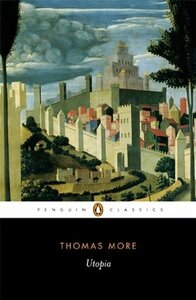Take a photo of a barcode or cover
Interesting book, though a little bit below my expectations (hhmm... always the expectations...).
In the edition I read, I found more interesting than the novel, a brief essay from Ursula K. Le Guin: I didn't know this writer and discovering her has been a great surprise.
In the edition I read, I found more interesting than the novel, a brief essay from Ursula K. Le Guin: I didn't know this writer and discovering her has been a great surprise.
No es curioso ni sorprende que siglos después nos encontremos elogiando el infantilismo inviable de la sempiterna mentalidad idealista. Es lo propio del pensamiento perezoso, el más común de todos, que en su empresa negadora de la naturaleza humana tiende a vomitar con bastante frecuencia documentos de escasísimo valor literario o intelectual.
Hay momentos simpáticos en la obra de Moro que, si no sirven de guía para construir la sociedad perfecta, al menos echan luces sobre las perversiones del imperialismo moderno, por ejemplo la justificación de instigar movimientos subversivos ahí donde los regímenes han perdido legitimidad, supuestamente, en la medida en que se han apartado del recto camino que les muestra la Historia: el humanismo, el telos progresista, la democracia; ideas todas que desembocan en la uniformidad, la monotonía, la complacencia y la esclavitud a planteamientos doctrinarios no menos vulgares que aquellos que buscaron suplir y perfeccionar.
Hay momentos simpáticos en la obra de Moro que, si no sirven de guía para construir la sociedad perfecta, al menos echan luces sobre las perversiones del imperialismo moderno, por ejemplo la justificación de instigar movimientos subversivos ahí donde los regímenes han perdido legitimidad, supuestamente, en la medida en que se han apartado del recto camino que les muestra la Historia: el humanismo, el telos progresista, la democracia; ideas todas que desembocan en la uniformidad, la monotonía, la complacencia y la esclavitud a planteamientos doctrinarios no menos vulgares que aquellos que buscaron suplir y perfeccionar.
It is Thomas' Moore's vision of a perfect state narrated through a fictional traveler having returned from a fictional island-state called Utopia. The book is split into two chapters: the first covers a criticism of 16th century England, the second part describes the Utopian island in how it conducts itself.
Starting with criticism of greed and excess in More's contemporary society of England, which is in the 16th century, the author describes a hopeful state for which all states should aspire to is a monotheistic national-socialist utilitarian society. Although that is not an entirely accurate description, because instead of a centralized government, the land is split into regions and cities which govern themselves through elected and easily re-elected officials. Laws are up-kept mostly through social pressures and discrimination.
My impression of the book is that the ideas put forth here rely too much on the very bottom of Maslow's pyramid of needs. However, whatever criticism I can come up with sounds very shallow when you regard that this book is written in the fifteen hundreds. Additionally it would seem that Sir Thomas More does not take himself too seriously and keeps the narrative of the book tongue-in-cheek with made up Old Greek names for peoples and disclaiming the reader through internal monologue that it is not worth discussing all of the arguments against such a system because they would be too numerous. It is more of a love letter to like-minded men who are incredulous to the validity of the current regime in England and around the world. And, even so, ideas put forth here were later expanded upon and morphed into the liberalization of the Western world.
All-in-all it is a pretty good book describing a very utilitarian and rational (albeit biased towards Christian beliefs) idea for a society, regardless of how dated it is.
Starting with criticism of greed and excess in More's contemporary society of England, which is in the 16th century, the author describes a hopeful state for which all states should aspire to is a monotheistic national-socialist utilitarian society. Although that is not an entirely accurate description, because instead of a centralized government, the land is split into regions and cities which govern themselves through elected and easily re-elected officials. Laws are up-kept mostly through social pressures and discrimination.
My impression of the book is that the ideas put forth here rely too much on the very bottom of Maslow's pyramid of needs. However, whatever criticism I can come up with sounds very shallow when you regard that this book is written in the fifteen hundreds. Additionally it would seem that Sir Thomas More does not take himself too seriously and keeps the narrative of the book tongue-in-cheek with made up Old Greek names for peoples and disclaiming the reader through internal monologue that it is not worth discussing all of the arguments against such a system because they would be too numerous. It is more of a love letter to like-minded men who are incredulous to the validity of the current regime in England and around the world. And, even so, ideas put forth here were later expanded upon and morphed into the liberalization of the Western world.
All-in-all it is a pretty good book describing a very utilitarian and rational (albeit biased towards Christian beliefs) idea for a society, regardless of how dated it is.
Ever wonder what a society of "Mary Sue's" would be like? well wonder no more! Your society is garbage for every reason you can imagine and the Narrator to Thomas More's Utopia will go into every conceivable intellectual bunny trail of why you're awful and how the Utopians are better than you in every way. Plato's wet dream come true and you damn better well like it!
challenging
informative
reflective
slow-paced
Plot or Character Driven:
N/A
Strong character development:
N/A
Loveable characters:
No
Diverse cast of characters:
No
Flaws of characters a main focus:
N/A
I thought Thomas More an intelligent and insightful man in pinpointing the ills of his time and society. Nothing has changed much since his time and many of his observations still stand today as it is observations on human nature.
However, when he got into the description of the ideal city, Utopia, I couldn’t help but feel he didn’t really understand human nature all that well. That is, if he presented Utopia as the goal, but the last comment in the book makes me think he presented an exaggeration, and only thought aspects of his ideal city would actually be ideal.
I also couldn’t stop myself from picturing this Utopia as more of a Dystopia. I kept imagining a horror film where a man stumbles upon a society that is so shiny and bright on the surface only to discover hidden horrors the longer he stayed there. And why is everyone dressed in the same plain clothes? It sounds so depressing!
Anyways, Thomas More knew his time and he empathized with the misfortunes of people in his time and place and pictured a place without all of it. But his time and place wasn’t the only one. I’m sure if he was in a different country, his Utopia would look a bit different.
PS the 1 star reviews of this book are hilarious.
However, when he got into the description of the ideal city, Utopia, I couldn’t help but feel he didn’t really understand human nature all that well. That is, if he presented Utopia as the goal, but the last comment in the book makes me think he presented an exaggeration, and only thought aspects of his ideal city would actually be ideal.
I also couldn’t stop myself from picturing this Utopia as more of a Dystopia. I kept imagining a horror film where a man stumbles upon a society that is so shiny and bright on the surface only to discover hidden horrors the longer he stayed there. And why is everyone dressed in the same plain clothes? It sounds so depressing!
Anyways, Thomas More knew his time and he empathized with the misfortunes of people in his time and place and pictured a place without all of it. But his time and place wasn’t the only one. I’m sure if he was in a different country, his Utopia would look a bit different.
PS the 1 star reviews of this book are hilarious.
It was rather...dull, but an easy read nonetheless. I probably won't remember any of it in a year's time. I do, however, find it astonishing that Raphael Hythloday recited the entire second book (eighty-six pages) without stopping--that would be quite impressive.
Read for Tudor/Stuart upper level history class... enjoyed comparing/contrasting how More wrote about Utopia with what was going on in the real world during the time period, but the introduction/conclusion parts on the edition we read were a little lengthy.
Read it for a class, it was neither good nor bad. Somewhere in the middle of it. I might change my mind once we analyze it in the class, though.
Interesting stuff. I spent most of the book devising main characters for a distopian novel set in Utopia. Who would have cause to rebel against this system? I'm not sure I buy that education/brainwashing could result in such a long lasting, peaceful society. I think More underestimates the human imagination.




